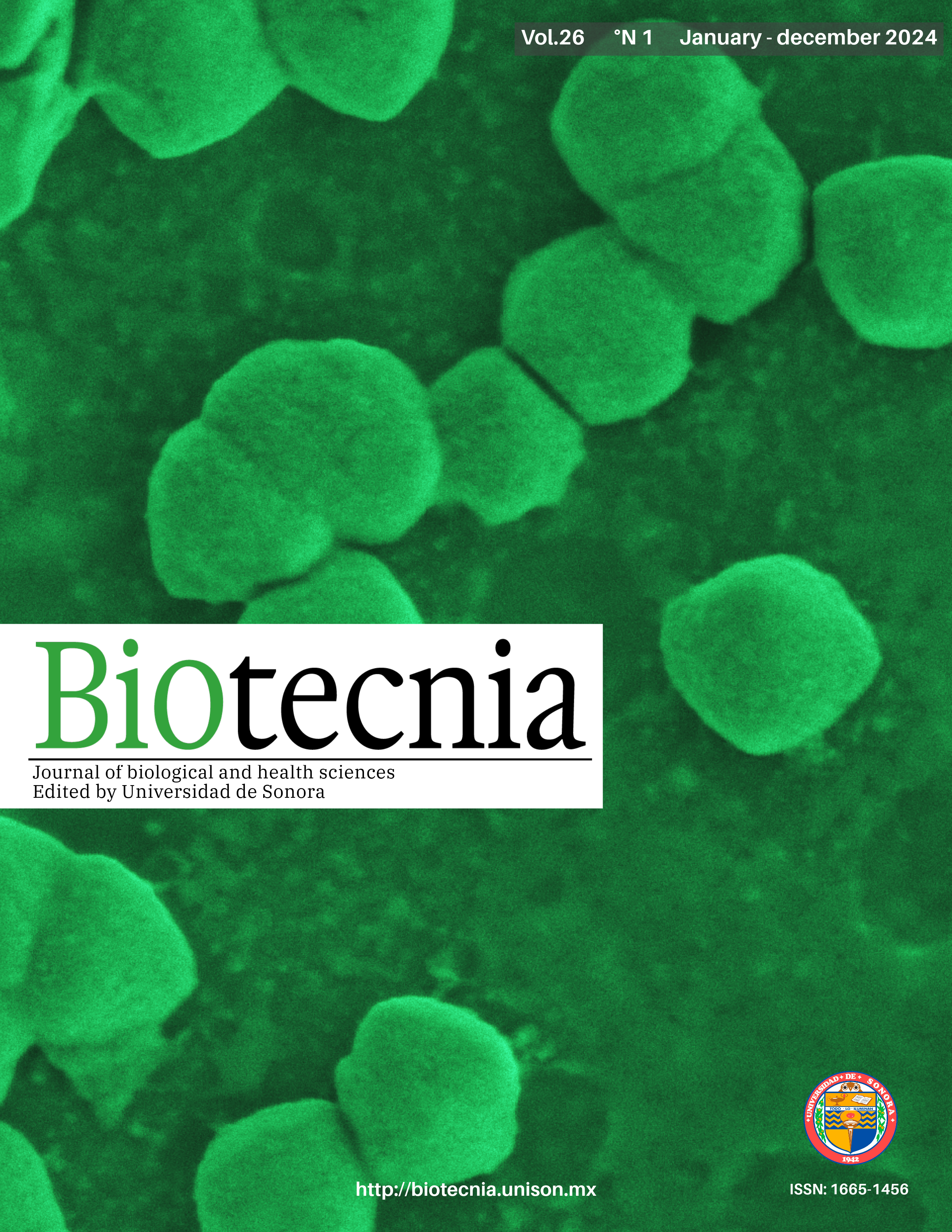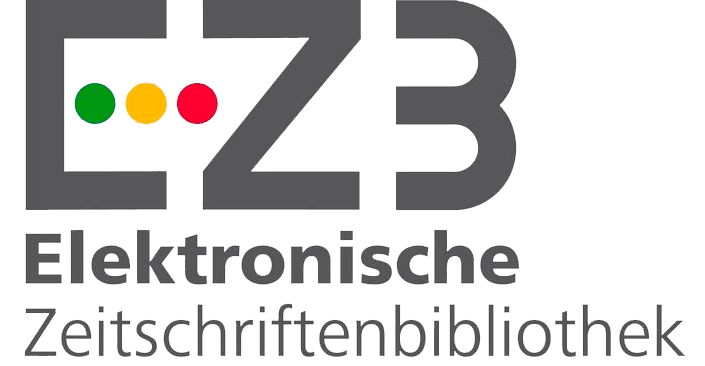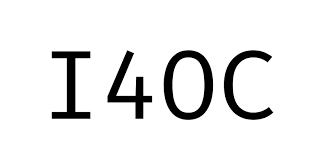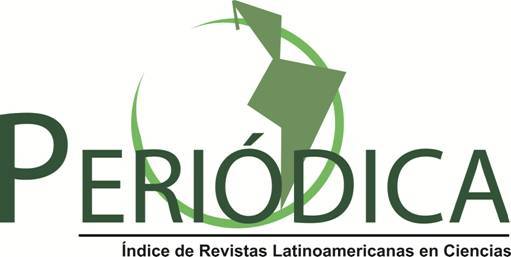De la pantalla al plato: relaciones causales entre la percepción de la utilidad del e-learning, la ansie-dad, la actividad física y los hábitos de alimentación saludables en estudiantes universitarios
DOI:
https://doi.org/10.18633/biotecnia.v26.2230Palabras clave:
salud mental, educación virtual, estudiantes universitarios, pandemia, comportamiento alimentarioResumen
Objetivo: Evaluar la relación entre la percepción de utilidad del e-learning, ansiedad, actividad física y hábitos alimenticios durante el confinamiento por COVID-19 en estudiantes universitarios. Metodología: Estudio transversal en 102 alumnos de licenciatura en salud (23 hombres, 79 mujeres, edad promedio 22.32 años). Respondieron encuestas sobre la percepción de e-learning, hábitos alimenticios, actividad física y ansiedad. Resultados. Los modelos de regresión lineal simple muestran que la percepción de utilidad de e-learning predice la ansiedad rasgo (F(1,100) = 9.13, p < 0.01, R2 = 0.084) y estado (F(1,100) = 11.66, p < 0.01, R2 = 0.104), y a su vez, la ansiedad rasgo (F(1,100) = 8.35, p = .01, R2 = 0.078) y estado (F(1,100) = 6.55, p < 0.05, R2 = 0.062) son predictoras de hábitos de alimentación saludable. Conclusiones: La percepción positiva del e-learning disminuye la ansiedad. Niveles altos de ansiedad se asocian con peores hábitos alimenticios. Esto indica que reducir la ansiedad puede mejorar los hábitos alimenticios.
Descargas
Citas
Al-Azzam, N., Elsalem, L., & Gombedza, F. (2020). A cross-sectional study to determine factors affecting dental and medical students’ preference for virtual learning during the COVID-19 outbreak. Heliyon, 6(12), e05704. https://doi.org/10.1016/j.heliyon.2020.e05704
Alsalhe, T. A., Aljaloud, S. O., Chalghaf, N., Guelmami, N., Alhazza, D. W., Azaiez, F., & Bragazzi, N. L. (2020). Moderation effect of physical activity on the relationship between fear of COVID-19 and gen-eral distress: A pilot case study in Arabic countries. Frontiers in Psychology, 11(9), 1–10. https://doi.org/10.3389/fpsyg.2020.570085
Aperribai, L., Cortabarria, L., Aguirre, T., Verche, E., & Borges, Á. (2020). Teacher’s Physical Activity and Mental Health During Lockdown Due to the COVID-2019 Pandemic. Frontiers in Psychology, 11(1), 1–14. https://doi.org/10.3389/fpsyg.2020.577886
Aroni, A., Castillo, E., Sousa, C., Machado, A., Filho, E., & Tenenbaum, G. (2017). Smartphone applica-tions used for initiating and maintaining physical activity: An exploratory analysis. Revista de Psicolo-gia Del Deporte, 27(1), 89–95. https://doi.org/https://ddd.uab.cat/record/187801
Arribathi, A. H., Suwarto, Miftakhu Rosyad, A., Budiarto, M., Supriyanti, D., & Mulyati. (2021). An Analysis of Student Learning Anxiety During the COVID-19 Pandemic: A Study in Higher Education. Journal of Continuing Higher Education, 69(3), 192–205. https://doi.org/10.1080/07377363.2020.1847971
Bandelow, B., Michaelis, S., & Wedekind, D. (2022). Treatment of Anxiety Disorders. Dialogues in Clin-ical Neuroscience, 19(2), 93–107. https://doi.org/10.31887/ DCNS.2017.19.2/bbandelow
Bawaneh, A. K. (2021). The Satisfaction Level Of Undergraduate Science Students Towards Using E-Learning And Virtual Classes In Exceptional Condition Covid-19 Crisis. Turkish Online Journal of Distance Education, 22(1), 52–65. https://doi.org/10.17718/TOJDE.849882
Bedoya-Cardona, E. Y., & Vásquez-Caballero, D. A. (2019). Estrés y Funcionamiento Cognitivo en Estu-diantes Universitarios. Revista Chilena de Neuropsicología, 14(1), 23–29. https://doi.org/10.5839/rcnp.2019.14.01.03
Brooks, S. K., Webster, R. K., Smith, L. E., Woodland, L., Wessely, S., Greenberg, N., & Rubin, G. J. (2020). The Psychological Impact of Quarantine and How to Reduce It: Rapid Review of the Evidence. Lancet, 395(10227), 912–920. https://doi.org/10.2139/ssrn.3532534
Cao, W., Fang, Z., Hou, G., Han, M., Xu, X., Dong, J., & Zheng, J. (2020). The psychological impact of the COVID-19 epidemic on college students in China. Psychiatry Research, 287(2020), 1–5. https://doi.org/https://doi.org/10.1016/j.psychres.2020.112934
Caravali-Meza, N. Y., Bacardí-Gascón, M., Armendariz-Anguiano, A. L., & Jiménez-Cruz, A. (2016). Validity of the IPAQ among Mexican adults with type 2 diabetes. Journal of Negative & Positive Re-sults, 1(3), 93–99. https://doi.org/10.19230/jonnpr.2016.1.3.1015
Cardona-Gómez, J., & Arango-Paternina, C. (2021). Consumo de alcohol en estudiantes de educación su-perior: Análisis de redes sociales de amigos universitarios. Retos, 44(2), 346–356. https://recyt.fecyt.es/index.php/retos/article/view/90679
Carek, P. J., Laibstain, S. E., & Carek, S. M. (2011). Exercise for the treatment of depression and anxiety. International Journal of Psychiatry in Medicine, 41(1), 15–28. https://doi.org/10.2190/PM.41.1.c
Chami, R., Monteleone, A. M., Treasure, J., & Monteleone, P. (2019). Stress hormones and eating disor-ders. Molecular and Cellular Endocrinology, 497(1), 110349. https://doi.org/10.1016/j.mce.2018.12.009
Chávez Márquez, I. L. (2021). Ansiedad en universitarios durante la pandemia de COVID-19: un estudio cuantitativo. Psicumex, 11(1), 1–26. https://doi.org/10.36793/psicumex.v11i1.420
Clark, L. A., Cuthbert, B., Lewis-Fernández, R., Narrow, W. E., & Reed, G. M. (2017). Three Approaches to Understanding and Classifying Mental Disorder: ICD-11, DSM-5, and the National Institute of Mental Health’s Research Domain Criteria (RDoC). Psychological Science in the Public Interest, 18(2), 72–145. https://doi.org/10.1177/1529100617727266
de Oliveira, M., de Oliveira, R., & Correia, A. (2020). Will Virtual Replace Classroom Teaching? Lessons from Virtual Classes via Zoom in the Times of COVID-19. Journal of Advances in Education and Philosophy, 04(05), 208–213. https://doi.org/10.36348/jaep.2020.v04i05.004
Di Polito, N., Stylianakis, A. A., Richardson, R., & Baker, K. D. (2023). Real-World Intake of Dietary Sugars Is Associated with Reduced Cortisol Reactivity Following an Acute Physiological Stressor. Nutrients, 15(1), 1–18. https://doi.org/10.3390/nu15010209
Durán-Galdo, R., & Mamani-Urrutia, V. (2021). Hábitos alimentarios, actividad física y su asociación con el estrés académico en estudiantes universitarios de primer año de ciencias de la salud. Revista Chilena de Nutrición, 48(3), 389–395. https://doi.org/10.4067/s0717-75182021000300389
Ferreira, C., Pereira, H. B., Campos, F., de Souza, M. A., & Barbosa, C. (2019). Role of eating disor-ders-related polymorphisms in obesity pathophysiology. Reviews in Endocrine and Metabolic Disor-ders, 20(1), 115–125. https://doi.org/10.1007/s11154-019-09489-w
Gallardo-Escudero, A., Muñoz, M. J., Planells, E. M., & López, I. (2015). La etapa universitaria no favo-rece el estilo de vida saludable en las estudiantes granadinas. Nutricion Hospitalaria, 31(2), 975–979. https://doi.org/10.3305/nh.2015.31.2.8303
García, L. (2021). COVID-19 y educación a distancia digital: preconfinamiento, confinamiento y posconfi-namiento. Revista Iberoamericana de Educación a Distancia, 24(1), 9–25. https://n9.cl/edp3
González, M. (2018). Validación del Cuestionario de Comedor Emocional (CCE) en Chile. Revista de La Sociedad Venezolana de Gastroenterologia, 72(1), 21–24. http://www.who.int/mediacentre/factshee
Hanlon, H. R., & Swords, L. (2019). Overthinkers, attention-seekers and wallflowers: peer perceptions of clinical anxiety disorders in adolescence. Journal of Public Mental Health, 18(1), 4–13. https://doi.org/10.1108/JPMH-07-2018-0049
Hassan, S. U. N., Algahtani, F. D., Zrieq, R., Aldhmadi, B. K., Atta, A., Obeidat, R. M., & Kadri, A. (2021). Academic self-perception and course satisfaction among university students taking virtual classes during the covid-19 pandemic in the kingdom of Saudi-Arabia (KSA). Education Sciences, 11(134), 1–14. https://doi.org/10.3390/educsci11030134
Herring, M. P., O’Connor, P. J., & Dishman, R. K. (2010). The effect of exercise training on anxiety symptoms among patients: A systematic review. Archives of Internal Medicine, 170(4), 321–331. https://doi.org/10.1001/archinternmed.2009.530
Holm, S. (2013). Declaration of Helsinki. In International Encyclopedia of Ethics (pp. 1–4). https://doi.org/https://doi.org/10.1002/9781444367072.wbiee230
Intelangelo, L., Gutiérrez, N. M., Bevacqua, N., Mendoza, C., Guzmán-Guzmán, I. P., & Jerez-Mayorga, D. (2022). Effect of Confinement by COVID-19 on the Lifestyle of the University Population of Argen-tina: Evaluation of Physical Activity, Food and Sleep. Retos, 43(1), 274–282. https://doi.org/10.47197/RETOS.V43I0.88461
Jayakody, K., Gunadasa, S., & Hosker, C. (2014). Exercise for anxiety disorders: Systematic review. Brit-ish Journal of Sports Medicine, 48(3), 187–196. https://doi.org/10.1136/bjsports-2012-091287
Kris-Etherton, P. M., Petersen, K. S., Hibbeln, J. R., Hurley, D., Kolick, V., Peoples, S., Rodriguez, N., & Woodward-Lopez, G. (2021). Nutrition and behavioral health disorders: Depression and anxiety. Nu-trition Reviews, 79(3), 247–260. https://doi.org/10.1093/nutrit/nuaa025
Lesser, I. A., & Nienhuis, C. P. (2020). The impact of COVID-19 on physical activity behavior and well-being of Canadians. International Journal of Environmental Research and Public Health, 17(23), 1–12.
Markiewicz-Gospodarek, A., Górska, A., Markiewicz, R., Chilimoniuk, Z., Czeczelewski, M., Baj, J., Maciejewski, R., & Masiak, J. (2022). The Relationship between Mental Disorders and the COVID-19 Pandemic—Course, Risk Factors, and Potential Consequences. International Journal of Environmental Research and Public Health, 19(15), 1–18. https://doi.org/10.3390/ijerph19159573
Márquez-Sandoval, Y. F., Salazar-Ruiz, E. N., Macedo-Ojeda, G., Altamirano-Martínez, M. B., Ber-nal-Orozco, M. F., Salas-Salvadó, J., & Vizmanos-Lamotte, B. (2014). Diseño y validación de un cuestionario para evaluar el comportamiento alimentario en estudiantes mexicanos del área de la salud. Nutricion Hospitalaria, 30(1), 153–164. https://doi.org/10.3305/nh.2014.30.1.7451
Maugeri, G., Castrogiovanni, P., Battaglia, G., Pippi, R., D’Agata, V., Palma, A., Di Rosa, M., & Musu-meci, G. (2020). The impact of physical activity on psychological health during Covid-19 pandemic in Italy. Heliyon, 6(6), e04315. https://doi.org/10.1016/j.heliyon.2020.e04315
McMahon, E. M., Corcoran, P., O’Regan, G., Keeley, H., Cannon, M., Carli, V., Wasserman, C., Had-laczky, G., Sarchiapone, M., Apter, A., Balazs, J., Balint, M., Bobes, J., Brunner, R., Cozman, D., Haring, C., Iosue, M., Kaess, M., Kahn, J. P., … Wasserman, D. (2017). Physical activity in European adolescents and associations with anxiety, depression and well-being. European Child and Adolescent Psychiatry, 26(1), 111–122. https://doi.org/10.1007/s00787-016-0875-9
Mendoza-Balcazar, J., & Biler-Reyes, S. A. (2021). Factores socio- económicos y sus efectos en hábitos alimentarios durante la pandemia Covid- 19 año 2020-2021 en la Ciudad de Manta. Revista Científica FIPCAEC, 6(3), 3–17. https://doi.org/https://doi.org/10.23857/fipcaec.v6i3.442
Morales-Beltrán, R., Hernández-Cruz, G., González-Fimbres, R., Rangel-Colmenero, B., Zazueta-Beltrán, D., & Reynoso-Sánchez, L. (2022). La actividad física como moderador en la ansiedad asociada al COVID-19 en estudiantes universitarios. Retos, 45(1), 796–806. https://recyt.fecyt.es/index.php/retos/article/view/92974
Murphy, L., Eduljee, N. B., & Croteau, K. (2020). College Student Transition to Synchronous Virtual Classes during the COVID-19 Pandemic in Northeastern United States. Pedagogical Research, 5(4), em0078. https://doi.org/10.29333/pr/8485
Ojeda, M. M., Muñoz, J. J., & Menéndez, E. P. (2020). Hábitos de vida saludables y rendimiento escolar en estudiantes universitarios. Revista de La Escuela de Ciencias de La Educación, 2(15), 34–44. https://doi.org/10.35305/rece.v2i15.544
Quintana-López, V. A., Jesús, D.-L. K. de, & Esther, M.-L. M. (2021). Conductas alimentarias de riesgo en estudiantes universitarios de la salud durante la pandemia por COVID-19. Revista La Sociedad Aca-démica, 29(58), 31–38. https://www.itson.mx/publicaciones/sociedad-academica/Documents/LSA 58_compressed.pdf#page=33
Rezaul, M., & Hasan, M. (2020). Virtual Classes during COVID 19 Pandemic in Tertiary Level in Saudi Arabia: Challenges and Prospects from the Students’ Perspective. Asian EFL Journal, 27(5.1), 205–219.
Ruiz-Aguilar, C. A., Urdapilleta-Herrera, E. D. C., & Lara-Rivas, G. (2021). Ansiedad en familiares de pacientes con COVID-19 hospitalizados en el Instituto Nacional de Enfermedades Respiratorias. Neumologia y Cirugia de Torax, 80(2), 100–104. https://doi.org/10.35366/100990
Sibley, C. G., Greaves, L. M., Satherley, N., Wilson, M. S., Overall, N. C., Lee, C. H. J., Milojev, P., Bulbulia, J., Osborne, D., Milfont, T. L., Houkamau, C. A., Duck, I. M., Vickers-Jones, R., & Barlow, F. K. (2020). Effects of the COVID-19 pandemic and nationwide lockdown on trust, attitudes toward government, and well-being. American Psychologist, 75(5), 618–630. https://doi.org/10.1037/amp0000662
Spielberg, C. D., González-Reigosa, F., & Martínez-Urrutia, Á. (1971). Develpement of the Spanish edition of the State-Trait Anxiety Inventory. Interamerican Journal of Psychology, 5(1), 3–4. https://doi.org/10.4135/9781483365817.n1316
ten Velde, G., Lubrecht, J., Arayess, L., van Loo, C., Hesselink, M., Reijnders, D., & Vreugdenhil, A. (2021). Physical activity behaviour and screen time in Dutch children during the COVID-19 pandemic: Pre-, during- and post-school closures. Pediatric Obesity, 16(9), 1–7. https://doi.org/10.1111/ijpo.12779
Urzúa, M. D. C., Rodríguez, D. P., Valencia, M. M., & Ruiz, R. E. (2020). Aprender ciencias experimen-tales mediante TIC en tiempos de covid-19: percepción del estudiantado. Praxis & Saber, 11(27), e11447. https://doi.org/10.19053/22160159.v11.n27.2020.11447
Valizadeh, M. (2021). Foreign Language Anxiety in Virtual Classrooms during the Covid-19 Pandemic in Turkey. St. Theresa Journal of Humanities and Social Sciences, 7(1), 54–80.
Zhang, Y., Zhang, H., Ma, X., & Di, Q. (2020). Mental health problems during the COVID-19 pandemics and the mitigation effects of exercise: A longitudinal study of college students in China. International Journal of Environmental Research and Public Health, 17(10), 1–16. https://doi.org/10.3390/ijerph17103722
Publicado
Cómo citar
Número
Sección
Licencia
Derechos de autor 2023

Esta obra está bajo una licencia internacional Creative Commons Atribución-NoComercial-CompartirIgual 4.0.
La revista Biotecnia se encuentra bajo la licencia Atribución-NoComercial-CompartirIgual 4.0 Internacional (CC BY-NC-SA 4.0)
















_(2).jpg)








